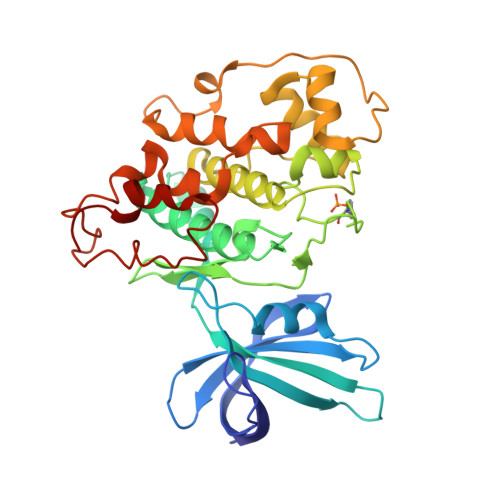Investigating Drug-Target Residence Time in Kinases through Enhanced Sampling Simulations.
Gobbo, D., Piretti, V., Di Martino, R.M.C., Tripathi, S.K., Giabbai, B., Storici, P., Demitri, N., Girotto, S., Decherchi, S., Cavalli, A.(2019) J Chem Theory Comput 15: 4646-4659
- PubMed: 31246463
- DOI: https://doi.org/10.1021/acs.jctc.9b00104
- Primary Citation of Related Structures:
6HK3, 6HK4, 6HK7 - PubMed Abstract:
It is widely accepted that drug-target association and dissociation rates directly affect drug efficacy and safety. To rationally optimize drug binding kinetics, one must know the atomic arrangement of the protein-ligand complex during the binding/unbinding process in order to detect stable and metastable states. Whereas experimental approaches can determine kinetic constants with fairly good accuracy, computational approaches based on molecular dynamics (MD) simulations can deliver the atomistic details of the unbinding process. Furthermore, they can also be utilized prospectively to predict residence time (i.e., the inverse of unbinding kinetics constant, k off ) with an acceptable level of accuracy. Here, we report a novel method based on adiabatic bias MD with an electrostatics-like collective variable (dubbed elABMD) for sampling protein-ligand dissociation events in two kinases. elABMD correctly ranked a ligand series on glucokinase, in agreement with experimental data and previous calculations. Subsequently, we applied the new method prospectively to a congeneric series of GSK-3β inhibitors. For this series, new crystal structures were generated and the residence time was experimentally measured with surface plasmon resonance (SPR). There was good agreement between computational predictions and experimental measures, suggesting that elABMD is an innovative and efficient tool for calculating residence times.
Organizational Affiliation:
Computational and Chemical Biology , Fondazione Istituto Italiano di Tecnologia , via Morego 30 , 16163 Genova , Italy.


















